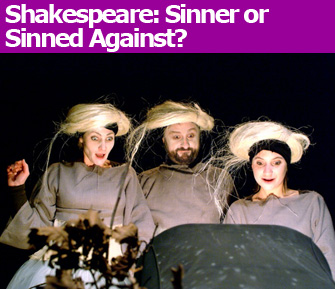 |
| Three rather unusual witches in Serge Poncelet’s production of Macbeth. |
 |
| Three rather unusual witches in Serge Poncelet’s production of Macbeth. |
Shakespeare appears to be ever-present in one form or another on the Paris stage. Two very different current productions – one a recital of a selection of the Bard’s sonnets in English (with French subtitles), the other a production of Macbeth translated into French – both offer some fresh ideas about staging Shakespeare but fall short of their ambitions.
Renowned Shakespeare theater director Peter Brook, who for the last three-and-a-half decades has had his theatrical base at the enchantingly derelict Théâtre des Bouffes du Nord, has chosen to stage a selection of 27 of 154 sonnets in Love Is My Sin (after Sonnet 142), grouping them together thematically and having them performed by two actors, Natasha Parry and Bruce Myers, both long-time members of the Centre International de Recherche Théâtral, which Brook created in 1970.
The production is an attempt to delve into William Shakespeare’s private life, exposing his thoughts about passion, jealousy and guilt, and also about his loves – for a man, for a woman and for writing itself.
Brook takes a matter-of-fact approach to Shakespeare’s love for another man, which is expressed in the sonnets and has sparked much discussion about the poet’s sexuality. His love for a man is clearly noted as a theme in the program, but in the production Brook lets the sonnets speak for themselves through the accomplished actors Parry and Myers, who take turns reciting their sonnets, at first ignoring each other on the bare stage but then increasingly interacting. Parry gives a pensive performance, while Myers offers a more vigorous delivery.
But why did both actors, dressed in everyday modern clothes, have to refer to their notes for prompts throughout the performance? I have never tried to memorize 13 or 14 sonnets myself, but Shakespearean actors have to learn their parts for an entire play, so it can’t be totally out of the question. Watching Parry and Myers perform was like watching a rehearsal or listening to a radio play.
The whole concept of this production is questionable. Shakespeare’s sonnets require reading and rereading to be absorbed. In this production, even though both Parry and Myers have truly beautiful voices, it was easier after a while to sit back and read the French translations projected onto the sides of the stage than to try to grasp the meaning of the sonnets through the spoken word.
I was also disappointed overall with the French production of Macbeth staged by the Théâtre de l’Opprimé and the Théâtre Yunqué theatre company, founded by Serge Poncelet, a former member of the avant-garde Théâtre du Soleil ensemble.
Poncelet, who directs and plays the lead role, is by far the best thing in it, giving a worthy performance that is full of energy and feeling, though I was let down by the rather pedestrian way he trotted out the famous “Tomorrow, and tomorrow, and tomorrow” monologue from Act V, Scene V. The killing of Macbeth at the end was also something of an anticlimax in comparison with the stylishly staged murders of Banquo and Lady Macduff and child.
Poncelet and Marlène Forsberg as Lady Macbeth play out a suitably macabre pas de deux together, but Forsberg lacks real depth in the role on her own. Apart from Banquo, the supporting actors don’t really make anything of their parts, either, maybe because they are all overstretched, with seven actors playing 22 roles.
The costumes and staging have an Oriental feel, Poncelet having been influenced by the Terracotta Army he saw on a trip to China. This provides for a sense of history, some interesting gestures and movement, and the chance to be creative with costumes, but having Lady Macbeth take pigeon steps with her hands in prayer position is going one step too far.
Moving away from the traditional three witches on a blasted heath in favor of some spooky, airy spirits was also something of a misfire, especially as a big, bearded bear of a man was rather laughably squeezed into one of the tutu-type costumes, though I understand the supernatural effect the director was trying to create. I did, however, like the natural look given to the stage, with lots of canvas, dried grass and wicker, which fit well and made me think of that eerie film The Wicker Man.
Poncelet has clearly tried to breathe something new into the play. It doesn’t always work, but he deserves credit for trying.
Nick Woods
Théâtre des Bouffes du Nord: 37 bis, boulevard de la Chapelle, 75010 Paris. Métro: La Chapelle. Through May 9. Tickets: €15. www.bouffesdunord.com
Théâtre de l’Opprimé: 78, rue du Charolais, 75012 Paris. Tel.: 01 43 45 81 20. Métro: Reuilly Diderot. Through May 3. Tickets: €16. www.theatredelopprime.com
Reader Reaction
Click here to respond to this article (your response may be published on this page and is subject to editing).
© 2009 Paris Update
Favorite
